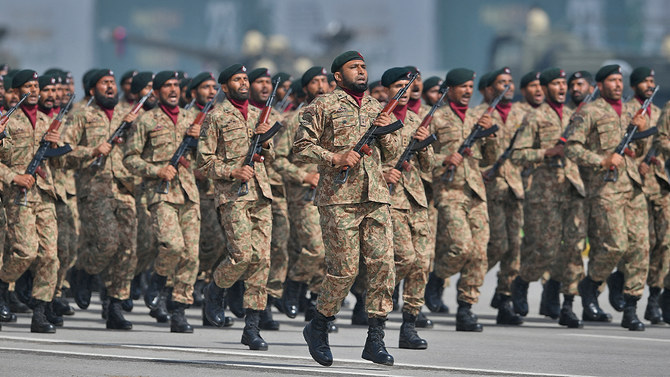
Pakistan’s Lament
Islamabad has a perpetual grudge that it isn’t taken seriously by the global community. While this observation is undeniably true, international apathy towards Pakistan is not due to politicking or vested commercial interests [as it claims], but solely due to Islamabad’s unabashed duplicity. With the Pakistan Army brazenly following its morbid strategy of nurturing terrorist groups as ‘strategic assets’ for waging proxy wars against its neighbours, how can Islamabad expect to be taken seriously by the international community?
Just one example of Pakistan’s perfidy- it keeps boasting about having conducted the world’s biggest anti-terrorist campaign [Operation Zarb-e-Azb] and emphasising that “We are going after terrorists of all hue and colour.” However, statistics don’t support its latter claim. Though the Pakistan Army claims to have neutralised as many as 3,500 terrorists during Operation Zarb-e-Azb, there’s not even a single terrorist belonging to the Haqqani network amongst the dead, which outrightly defies the laws of probability but is a mere happenstance for Rawalpindi!
So, when Pakistani Prime Minister Shehbaz Sharif declared that “Terrorism in all its forms and manifestation, including state terrorism, must be condemned in clear and unambiguous terms” while addressing the 23rd SCO meet, he had probably expected the international media to lap up his telltale. However, this didn’t happen and his brave words went largely unnoticed, because taking Islamabad’s comments at face value, especially when related to terrorism, can be very embarrassing for the media.
Pakistan’s Anti-Terrorism Pretense
A month before the 23rd SCO meet, Indian security forces and J&K police jointly thwarted up to five attempts by Pakistan trained terrorists to infiltrate across the Line of Control [LoC] in J&K. The fact that a total of 11 foreign intruders were killed in these operations leaves no room for doubt regarding the Pakistani establishment’s active involvement in sponsoring cross border terrorism. No wonder Sharif’s condemnation of terrorism wasn’t taken seriously by anyone.
Barely two weeks have elapsed since the Pakistani prime minister used the SCO platform to condemn terrorism, and it’s business-as-usual as far as attempts at infiltration across the LoC are concerned. With the Indian security forces and J&K police thwarting two back-to-back major attempts by Pakistan based terrorists to infiltrate across the LoC in the Poonch sector, Pakistan’s double talk on terrorism has yet once again been exposed.
Prognosis
Some analysts believe that sooner or later, the realisation that adopting a confrontationist approach towards India comes at a prohibitive cost will compel Islamabad to mend fences with New Delhi. This eventuality is theoretically possible; but when a country claims that its people are prepared to eat grass or even stay hungry just in order to match its neighbour militarily, then any logic-driven rapprochement initiative becomes a distant dream.
Ashley J. Tellis, a senior fellow at the Carnegie Endowment for International Peace, specialising in international security and U.S. foreign and defence policy with a special focus on Asia and the Indian subcontinent has no illusions about Pakistan seriously considering dialogue with India to normalise relations. Au contraire, he is sanguine that “The international community’s routine call for continuous India-Pakistan dialogue is not only misguided but also counterproductive.”
Tellis points out that “This entreaty [for dialogue], which often follows major Pakistani-supported terrorist attacks in India, fails to recognize that the security competition between the two nations is not actually driven by discrete, negotiable differences.”
He goes on to explain that “… the discord is rooted in long-standing ideological, territorial, and power-political antagonisms that are fuelled by Pakistan’s irredentism, its army’s desire to subvert India’s ascendency as a great power and exact revenge for past Indian military victories, and its aspirations to be treated on par with India despite their huge differences in capabilities, achievements, and prospects.”
Pakistani politicians have realised that promoting anti-India sentiments amongst the population is a foolproof mechanism for diverting public opinion from its own humongous failings. Similarly, in order to exercise sweeping extra-constitutional powers and justify consuming a lion’s share of the national budget, Rawalpindi has demonised India as an existential threat and how the army is preventing New Delhi from embarking on its hegemonistic ambition to wipe out Pakistan’s very identity.
India’s Reaction
In view of the aforesaid, any hope of Pakistan smoking the peace pipe with India in the foreseeable future is nothing but a grand illusion- and the sooner India accepts this harsh reality, the better it would be for the country. With Pakistan Army’s no-holds-barred attempts to push-in terrorists into J&K, there’s definitely a need to ensure that the anti-infiltration grid established by Indian security forces has the intrinsic ability as well as requisite redundancy to decisively defeat Rawalpindi’s nefarious designs.
Use of advanced technology to detect infiltration and track down terrorists is a great force-multiplier, and hence must be fully exploited. However, since the thickly forested area and rugged terrain along the LoC favours infiltration, technology cannot replace the requirement of ensuring adequate ‘boots-on-ground’. It’s heartening to note that the Indian army has accorded this important issue the due attention it deserves by shelving plans to shift troops from J&K to Ladakh.
What India is facing in J&K isn’t mere terrorism- it’s a full blown proxy war and has to be viewed accordingly because misconstruing inactivity in terms of infiltration attempts and terror related incidents in a particular sector along the LoC as an indicator of normalcy could prove suicidal. It doesn’t require rocket science to discern that such an abnormal state of affairs could well be a ploy to induce military commanders into shifting troops from a particular area to elsewhere and unwittingly creating a safe passage for use by infiltrators.
Lastly, with former Pakistan Army chief Gen Qamar Javed Bajwa declaring that “Pakistan Army firmly stands by the Kashmiris in their just struggle to the very end [and] we are prepared and shall go to any extent to fulfil our obligations…,” wouldn’t it be naïve to believe the balderdash that terrorism in J&K is being fuelled by non-state actors?
